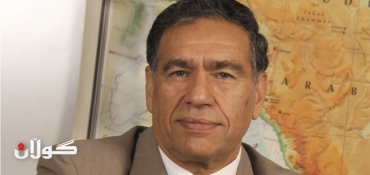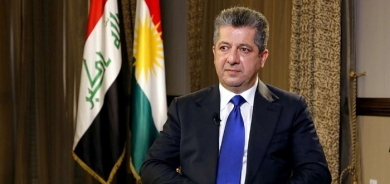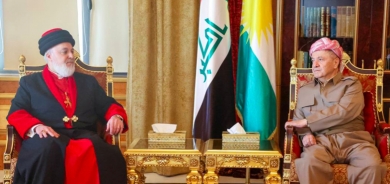Dr. Alam Payind to Gulan: Iraqis should first decide among themselves and not let outside forces . . . to interfere
December 30, 2012
Exclusive Interviews

Dr. Alam Payind is the Director of the Middle East Studies Center (MESC), a senior teaching member of the International Studies Program and the Near Eastern Languages and Cultures department, a liaison for the Office of International Students and Scholars, and a member of University's International Programs Task Force. Born and raised in Afghanistan, and previously a holder of government and academic positions in Kabul, he speaks Pashto, Dari and Urdu with native fluency. He continues to conduct field work, provide consultations on a regular basis in Afghanistan and has visited the country 10 times since September 11th, 2001. He travels extensively within the Afghan borders, and during recent trips he has been witness to the Taliban's resurgence in Kandahar, Helmand, and Zabul.An Exclusive Interview with Dr. Alam Payind
1- Iraq now is in a difficult political situation. That is, the political process is in a severe crisis, and the security situation is in crisis as well, following the wave of explosions which covered the Iraqi cities over the past days. In your view, to what extent has the political crisis created a gap in the security situation of the country?
- Iraq is not an easy job. After many years of wars and dictatorship of Saddam Hussein, there is now the Shiite-Sunni divide, on the one hand, and the Kurdish-Arab issues, on the other. However, in the neighborhood of Iraq the situation invites involvement in Iraq, and also the United States and the coalition forces have still some sort of residues. Thus, Iraq is in a situation that no one can expect the things will get better soon, especially if the constitution is in the way it is right now, and the grievances of some minorities, like the Kurdish and Sunni Arabs, have not been addressed so far. Hence, the political situation will continue to deteriorate, as well as the security situation because they are linked together. I think there is a possibility that the things might get worse if all these other issues, social and political issues, are not addressed.
2- Do you think this gap is because the PM, Maliky, refuses to comply with the constitution?
- No I'm not saying if he is complying or he is not complying. After many years of suppression of Shiites in Iraq, now they are controlling the government because they make up the majority and there is no question about that. The statistics show that in Iraq the Shiites form sixty per cent of the population, and then the Sunni Iraqis and then there are Kurds. Kurds, with the Sunni Arabs, also form the overwhelming majority, so there is this Sunni-Shiite divide. When you look at the history of Iraq, for centuries, the governments were in the hands of Sunni Arabs, even at a time of Ottoman Empire, and after World War I, when Iraq came under the control of the British, the Sunnis have still dominated the politics, until recently, after Saddam was thrown. Thus, all these problems which exist have their roots in the past. But unfortunately the current government, and the current establishment in Iraq, has not addressed some of these issues of the Kurdish and the Sunni minorities. The outside interference is also a problem, United States and Coalition forces have different objectives, and Iran has a different security interest in Iraq, and now the situation in Syria, a neighboring country of Iraq, and also the other Sunni majority countries which are surrounding Iraq, is deteriorating. The issues in Lebanon, and the Arab-Israeli issues, in one way or another, are also affecting the politics. So it is a very complicated picture when you look at it. Yet, unfortunately, the new regime that has been established in Iraq since 2003, has not settled its sectarian and ethnic issues. Thus, as long as those issues are not addressed, there will be some sort of unrest in Iraq.
3- Now, the regional situation is undergoing changes, and if the Syrian regime falls apart, it may have a negative influence on the situation in Iraq whereby the terrorists are likely to return back to Iraq. To what extent will undermining the regional security have an impact on Iraq?
- The external forces are very important. Iran has its security interests in Iraq and so has the Lebanon. That is, even some of the countries which do not have direct boundaries have security interests in Iraq. For example, all the gulf countries—Qatar and Saudi Arabia-- have security interests in both Syria and Iraq. They all have their own agenda in the region. Thus, it is a complicating picture. The United States and Israel have also their security interests and they are making the situation even more complicated. Yet, I'm talking about the internal dimension which is the Shiite Arabs, the Sunni Arabs, the Kurds and the Turkmens, and the Christians are also the minority. So they all have rights in Iraq. These groups are deprived of their rights and their basic grievances have not been addressed in the past--sometimes the majorities do not respect the wish and the will of the minorities and become tyranny of the majority. It is true that the Shiite is the majority, but the Shiites should not marginalize the other minorities.
4- There is no other way rather than national reconciliation to protect Iraq, but this process is getting more and more complicated each day especially since the prime minister is not ready to make reforms or to comply with the constitution. In your opinion, to what extent can the situation be rescued from this phase? Or Are you optimistic about the situation?
- No I'm not optimistic about the situation, you're absolutely right; constitutions are written by human beings. These are not things which have come as revelations from God. Human beings, members of the country and the constitution committees, write a constitution. Then it is ratified in the country and it is approved. When this document is approved, it has to be respected. Some people just deliberately violate a constitution. The same thing is going on in Afghanistan right now: the constitution says one thing, yet people who have the authority and are in power are doing something different, which is not based on the spirit of the constitution. So the same thing is happening in Iraq, too.
5- Undermining the security situation and lack of the government's capability to provide public services have made and will make the Iraqi people pay for it. In your view, how long must the Iraqi people pay for the wrong policies of the government?
- No one can say with any certainty that what will be the future in Iraq, but I was just mentioning that the process of reconciliation-- and you used that term earlier-- in Iraq has not taken place. There is a good model in South Africa: After years of atrocities by the white supremacists in South Africa, they have committed all kinds of injustice to the blacks who are the majority, but when Nelson Mandela came, the blacks did not take revenge, they formed equation for the reconciliation and Desmond Tutu was the head of that commission, and they did address all these issues. Thus, these sorts of things are needed in any post-war and post-conflict societies, such as Iraq, Lebanon, probably Syria, and Afghanistan. Yet, in Iran after the overthrow of the Shah, these sorts of things had not happened--it was only force--they wanted just to subjugate their people by weapons, by police and by military. And to certain extent, these things are working, but not addressing the deeply rooted issues which are ethnic, sectarian and religious issues in the country. So, the situation will be unstable and security problems will continue unless they are addressed at some point. Unfortunately Iraq has not done this in my opinion.
• Message for Iraqi people:
Iraq is one of the richest countries in the world in terms of its young population and natural resources. The oil is one of the resources. Iraq has been one of the richest countries in the world from the history, from the Mesopotamian civilization and Babylonian civilization… Iraq has two most important rivers in it, Euphrates and Tigris, and so it has so many civilizations… Iraq can be a great country, it has the potential to become so, but the messy situation is preventing it to become one of the most important countries in the world. It has all the potential and it will be, first, up to the Iraqis… I would suggest that "Iraqis should first decide among themselves and not let outside forces including Iran and Saudi Arabia or Syria and others to interfere, then there is a possibility that the things might get better".















